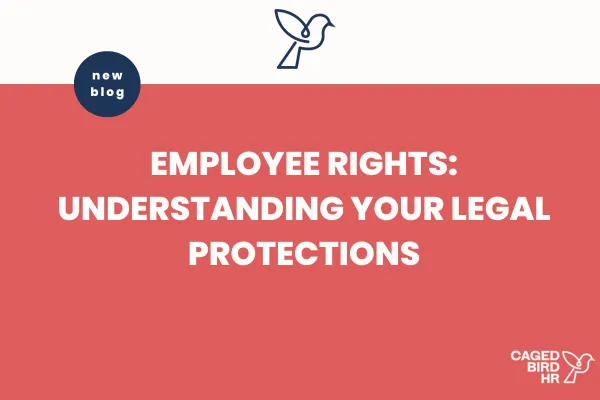Blogs

Employee Rights: Understanding Your Legal Protections
The Top 10 Employee Rights Laws you Should Know
As an employe3, it's important to be aware of the top 10 employee rights laws in the United States. Title VII of the Civil Rights Act prohibits discrimination based on race, color, religion, sex or national origin. The Americans with Disabilities Act ensures equal opportunity for individuals with disabilities while FMLA provides leave for eligible employees dealing with family and medical issues. FLSA establishes minimum wage and overtime standards as ADEA forbids age-based discrimination in employment. NLRA protects employee rights to organize and participate in collective bargaining while USERRA guarantees reemployment rights for service members. OSHA enforces occupational health and safety standards as WARN requires employers to provide advance notice before mass layoffs or plant closings finally EPA demands gender-based pay equality at workplaces across America.
1. Title VII of the Civil Rights Act of 1964
Title VII of the Civil Rights Act of 1964 prohibits employment discrimination based on race, color, religion, sex and national origin. This law applies to employers with 15 or more employees and covers all aspects of employment including hiring, promotion, wages and retaliation for reporting discrimination.
It is essential that you understand their obligations under Title VII to ensure equal opportunity in the workplace. Employers must maintain fair standards for hiring decisions and provide a safe working environment free from harassment or other forms of discriminatory behavior. Failure to comply with Title VII can result in significant legal consequences including lawsuits and fines from the Department of Labor's Equal Employment Opportunity Commission (EEOC).
2. Americans with Disabilities Act (ADA)
The Americans with Disabilities Act (ADA) is a federal law that prohibits discrimination against individuals with disabilities in various areas, including employment. This act requires employers to provide reasonable accommodations for employees or job applicants with disabilities and ensures equal opportunity in hiring, promotions, wages, and other employment-related practices. Employers who violate the ADA can face legal action from the Department of Justice or Equal Employment Opportunity Commission.
Under the ADA, it is also illegal for employers to retaliate against an employee or applicant who exercises their rights under this act. Retaliation can take many forms such as demotion, termination, reduction in pay or hours worked. It's important for employers to understand and comply with all aspects of the ADA to ensure they are providing fair opportunities and treatment for all employees regardless of any disability status they may have.
3. Family and Medical Leave Act (FMLA)
The Family and Medical Leave Act (FMLA) is a federal law that guarantees eligible employees the right to take up to 12 weeks of unpaid leave per year for certain family or medical reasons. The act applies to employers with 50 or more employees, and workers who have been employed by their current employer for at least 12 months are eligible. During this time off, employers must maintain the employee's health benefits and ensure that they return to their same or an equivalent job position upon their return.
Additionally, the FMLA protects employees from retaliation for exercising their rights under the law. Retaliation can include anything from termination of employment to denial of promotions or other opportunities within the company. It is crucial for both employers and employees to understand these rights in order to avoid any legal issues surrounding an employee's need for leave due to a serious medical condition or family matter such as birth, adoption, foster care placement, caring for a spouse/child/parent with a serious health condition etc..
4. Fair Labor Standards Act (FLSA)
The Fair Labor Standards Act (FLSA) is a federal law that sets certain standards for employee rights, wages, and working conditions. The act covers millions of workers in the US and establishes minimum wage requirements, overtime pay rules, child labor regulations, and more.
Key points to know about FLSA:
The current federal minimum wage under FLSA is $7.25 per hour.
Non-exempt employees are entitled to time-and-a-half pay for any hours worked over 40 in a workweek.
Child labor laws prohibit children under the age of 14 from most types of employment.
Employers must provide safe working conditions free from hazards that could cause injury or death.
5. Age Discrimination in Employment Act (ADEA)
The Age Discrimination in Employment Act (ADEA) is a law that prohibits employers from discriminating against employees or job applicants who are age 40 or older. Here are some key points to keep in mind regarding ADEA:
It applies to employers with 20 or more employees.
The law covers all aspects of employment, including hiring, promotions, pay, and termination.
It also prohibits retaliation against individuals who file discrimination complaints.
Employees have the right to work without fear of discrimination based on their age. Employers should ensure they comply with ADEA standards and provide equal opportunity for all candidates regardless of their age.
6. National Labor Relations Act (NLRA)
The National Labor Relations Act (NLRA) is a federal law that protects the rights of employees to engage in union activities and collective bargaining. The NLRA applies to most private sector employers in the United States, regardless of whether they have a unionized workforce or not. The law prohibits employers from interfering with their employees’ rights to organize, join a union, or bargain collectively.
Under the NLRA, employees have the right to form and join unions as well as participate in strikes and other lawful activities. It also prohibits retaliation against those who engage in these protected activities. Employers are required by law to recognize and bargain with unions if a majority of their employees vote for representation, ensuring fair labor standards are upheld within organizations across all industries throughout the US.
7. Uniformed Services Employment and Reemployment Rights Act (USERRA)
The Uniformed Services Employment and Reemployment Rights Act (USERRA) protects the employment rights of individuals who serve in the military. This law requires employers to reemploy returning service members without discrimination, as long as certain conditions are met. Employers must also provide benefits that would have accrued during their absence, such as health insurance or retirement benefits.
Under USERRA, employees who take leave to serve in the uniformed services must be reinstated to the same position they held before their leave. They are entitled to any promotions or raises they would have received if not for their military service. Employers cannot retaliate against employees for taking leave under this act and must make reasonable efforts to accommodate any disabilities incurred during service.
8. Occupational Safety and Health Act (OSHA)
Employers have a duty to provide a safe and healthy work environment for their employees. The Occupational Safety and Health Act (OSHA) is a federal law that sets standards for workplace safety across the United States. Under OSHA, employers are required to provide training on workplace hazards, maintain accurate records of injuries and illnesses, and provide protective equipment when necessary. Employees also have the right to report workplace hazards without fear of retaliation from their employer.
In addition to setting safety standards for workplaces, OSHA also provides protections against discrimination or retaliation in relation to employee reports of hazardous working conditions. Employers who violate OSHA regulations can face fines or even criminal charges if they knowingly disregard the health and safety of their employees. It is important for both employers and employees to understand their rights under OSHA in order to ensure a safe work environment for all involved parties.
9. Worker Adjustment and Retraining Notification Act (WARN)
The Worker Adjustment and Retraining Notification Act (WARN) is a federal law that requires employers to provide advance notice of plant closings or mass layoffs. The act applies to employers with 100 or more full-time employees, excluding part-time workers. Employers must give at least 60 days' written notice to affected employees, as well as local officials and state dislocated worker units.
Employees have the right under WARN to receive timely notification of impending job loss due to company restructuring or downsizing. This allows them time to prepare for financial hardships and search for new employment opportunities. Failure by an employer to comply with WARN can result in penalties and legal action against the company, making it crucial for employers to understand their obligations under this law.
10. Equal Pay Act (EPA)
The Equal Pay Act (EPA) is a federal law that prohibits employers from paying men and women different wages for performing the same job. The act was signed into law in 1963, with the aim of addressing wage discrimination based on gender. To comply with this act, employers must ensure equal pay for all employees who perform substantially similar work, regardless of their gender.
Under the EPA, employees have the right to file complaints if they believe they are being paid unfairly compared to colleagues of a different gender doing similar work. Employers found guilty of violating this act may be required to pay back wages and face fines or other penalties. It is essential for employers to understand their obligations under EPA as part of their commitment towards employee rights in the workplace.

Better Work, Better Life
Support@cagedbirdhr.com
Copyright 2025 Caged Bird HR®., a Worklution Inc Company All Rights Reserved

